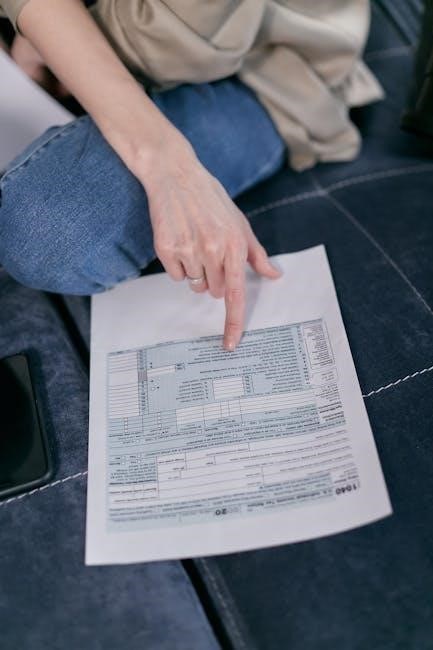General Information About Form 8308
Form 8308 is filed by partnerships to report sales or exchanges of partnership interests involving unrealized receivables or inventory items under Section 751(a), ensuring accurate tax reporting to avoid penalties.
Purpose of Form 8308
Form 8308 is used by partnerships to report the sale or exchange of a partner’s interest when the transaction involves unrealized receivables or inventory items. Specifically, it is required under Section 751(a) of the Internal Revenue Code, which mandates reporting when money or property received in exchange for a partnership interest is attributable to such assets. This form ensures accurate tax reporting by providing detailed information about the transaction, including the partner’s share of gains or losses. It helps prevent misclassification of assets and ensures compliance with IRS regulations. By filing Form 8308, partnerships can accurately reflect the tax implications of these transactions and avoid potential penalties associated with incorrect reporting.
Recent Updates to Form 8308
Recent updates to Form 8308 reflect changes in IRS regulations and reporting requirements. The IRS has introduced revisions to improve clarity and accuracy in reporting sales or exchanges of partnership interests under Section 751(a). Taxpayers are now provided with penalty relief and guidance through Notice 2024-19, which addresses common questions and challenges in completing the updated form. Additionally, the IRS has emphasized the importance of accurately classifying assets and reporting gains or losses attributable to unrealized receivables or inventory items. Partnerships are encouraged to review the revised form and instructions carefully to ensure compliance with the latest regulatory changes. These updates aim to streamline the reporting process and reduce errors, ensuring adherence to current tax laws and regulations.
Importance of Filing Form 8308
Filing Form 8308 is essential to ensure compliance with IRS regulations and prevent penalties. It accurately reports sales or exchanges of partnership interests involving unrealized receivables or inventory items under Section 751(a). Proper filing avoids misclassification of assets and ensures partners are not subjected to unintended tax liabilities. Form 8308 must be attached to Form 1065, U.S. Return of Partnership Income, for the relevant tax year. Failure to file or incorrect reporting can lead to IRS penalties and complications. The form plays a critical role in maintaining transparency in partnership transactions and ensuring all parties adhere to tax obligations. Accurate reporting through Form 8308 helps prevent disputes and ensures compliance with IRS guidelines, safeguarding both the partnership and its partners from potential issues.

Filing Instructions for Form 8308
Filing Form 8308 requires careful preparation to ensure accuracy and compliance with IRS regulations. Partnerships must submit the form by the designated deadline, attaching all required documentation.
When to File Form 8308
Form 8308 must be filed annually, typically by the 15th day of the 4th month following the close of the partnership’s tax year. This aligns with the partnership’s tax return deadline. If the partnership requests an extension, the filing deadline is extended by six months. However, the form is generally required when reporting certain transactions, such as sales or exchanges of partnership interests under Section 751(a). The IRS mandates timely filing to avoid penalties, emphasizing the importance of adhering to the specified deadlines.
How to File Form 8308
To file Form 8308, partnerships must ensure eligibility under Section 751(a) and gather all necessary documentation, including partnership agreements and transaction details. The form must be completed accurately, with all required fields filled out. Attachments, such as schedules or additional statements, must be included as specified. Partnerships can file electronically through the IRS e-file system or by mailing the form to the designated address. Ensure the form is signed by an authorized representative to avoid processing delays. Filing must be done in accordance with the IRS deadlines to prevent penalties. Proper preparation and adherence to instructions are essential for a smooth filing process.
Where to File Form 8308
To determine where to file Form 8308, partnerships should refer to the IRS instructions for specific mailing addresses. Generally, the form is mailed to the IRS address corresponding to the partnership’s legal residence or principal business location. For example, partnerships in specific states or territories must send the form to designated IRS service centers. Always verify the most current IRS filing addresses to ensure timely processing. Electronic filing options are also available through IRS-approved platforms, eliminating the need for mailing. Accurate filing addresses are crucial to avoid delays or penalties. Partnerships should consult the IRS website or seek professional advice for the most up-to-date information on filing locations and requirements. Proper submission ensures compliance with IRS regulations.
Attachments Required for Form 8308
When submitting Form 8308, certain attachments are necessary to ensure compliance with IRS requirements. Partnerships must include a detailed statement outlining the transaction, including the transfer of partnership interests and any related liabilities or assets. Additionally, copies of agreements or contracts governing the transaction should be attached. If the partnership is reporting gains or losses, supporting documentation, such as appraisals or valuations, may be required. The IRS also mandates that a schedule listing all partners affected by the transaction be included. Failure to provide these attachments may result in processing delays or penalties. Always refer to the IRS instructions for Form 8308 to confirm the specific documentation needed for your situation. Accurate and complete attachments are essential for proper filing. Partnerships should consult the IRS website or seek professional advice to ensure all requirements are met. Proper documentation ensures compliance with tax regulations and avoids potential issues. Timely submission with all necessary attachments is crucial for efficient processing.

Understanding the Tax Implications

Form 8308 requires understanding the tax implications of partnership interest transactions, including capital gains, ordinary income, and asset classification, ensuring accurate reporting to comply with IRS regulations.
Section 751(a) Exchange Overview
A Section 751(a) exchange pertains to the tax treatment of certain partnership interest transfers involving unrealized receivables and inventory. Under this section, gains or losses from such transactions are classified as ordinary income rather than capital gains. This rule applies when a partner’s interest is transferred, and the partnership holds assets subject to Section 751, such as accounts receivable or inventory. The purpose is to prevent tax deferral by ensuring that inherent gains in these assets are recognized at the time of transfer. Proper classification under Section 751(a) is crucial for accurate reporting on Form 8308, as it directly impacts the tax liabilities of both the partnership and its partners. Compliance ensures adherence to IRS guidelines and avoids potential discrepancies in tax filings.
Unrealized Receivables and Inventory Items
Unrealized receivables and inventory items are critical components in tax reporting, particularly for partnerships. These assets represent potential income or value that has not yet been realized through sale or collection. For tax purposes, unrealized receivables include amounts owed for services or goods, while inventory items are goods held for sale or production. Under Section 751(a), the transfer of a partnership interest involving these assets can trigger ordinary income treatment. Accurate identification and valuation of these items are essential for Form 8308, as they directly impact the calculation of gains or losses. Misclassification can lead to compliance issues, emphasizing the need for precise reporting. Proper documentation and understanding of these assets ensure adherence to IRS guidelines and prevent potential discrepancies in tax filings.
Tax Classification of Partnership Interests
The tax classification of partnership interests is pivotal for accurate reporting on Form 8308. A partnership interest is generally classified as either a capital interest or a profit-sharing interest. Capital interests represent ownership in the partnership’s assets, while profit-sharing interests relate to the right to receive a portion of the profits. The IRS requires clear distinction between these classifications, as they influence the tax treatment of transactions involving partnership interests. Misclassification can lead to incorrect reporting of gains or losses. Proper classification ensures compliance with IRS regulations and accurate representation of a partner’s stake in the partnership. This distinction is critical for both the partnership and the partners involved in transactions reported on Form 8308.
Ordinary Income Assets in Transactions
Ordinary income assets in transactions reported on Form 8308 are assets whose sale or exchange generates ordinary income rather than capital gain or loss. These assets include inventory, accounts receivable, and depreciable property held for sale or exchange in the ordinary course of business. When such assets are transferred in a Section 751(a) exchange, the partner must recognize ordinary income to the extent of the asset’s unrealized gain. This treatment ensures that the tax implications align with the nature of the assets involved. Proper identification and reporting of ordinary income assets are essential to avoid misclassification and ensure compliance with IRS rules. Accurate reporting helps prevent penalties and ensures proper tax treatment for all parties involved in the transaction.

Reporting Requirements
Partnerships must report specific transactions involving ordinary income assets, ensuring accurate documentation and timely filing to comply with IRS regulations and avoid penalties.
Partnership’s Duty to Report
A partnership must report certain transactions involving section 751(a) assets to the IRS using Form 8308. This duty ensures compliance with tax regulations and proper documentation of gains or losses. Partnerships are required to disclose detailed information about these transactions, including the type of assets involved and the partners’ shares. Accurate reporting is crucial to avoid penalties and ensure fairness in tax liability distribution. The partnership must also maintain records to support the reported information. Failure to fulfill this duty can result in legal consequences, emphasizing the importance of timely and precise reporting. Partnerships play a key role in ensuring transparency and adherence to IRS guidelines in such transactions.
Partner’s Role in the Transaction
In transactions involving section 751(a) assets, partners play a crucial role in ensuring compliance with IRS requirements. Each partner must be aware of their share of gains or losses resulting from the exchange. Partners are responsible for reporting their proportionate share of these amounts on their individual tax returns. They must also review the information provided by the partnership to ensure accuracy. Partners are obligated to understand how section 751(a) assets affect their personal tax situations. While the partnership files Form 8308, partners must ensure their own compliance with tax laws. This includes seeking professional advice if necessary to navigate complex reporting rules. Accurate reporting by partners is essential to avoid discrepancies and penalties.
Required Documentation for Reporting
To accurately report transactions under section 751(a), specific documentation must be maintained and submitted. Partnerships are required to provide detailed records of the exchange, including descriptions of the assets involved. A clear breakdown of the partnership’s interests and the allocation of gains or losses among partners is essential. Documentation must also include the adjusted tax basis of the assets at the time of the exchange. Additionally, partnerships should retain records of the fair market value of the assets and any related liabilities. Proper documentation ensures compliance with IRS requirements and facilitates accurate reporting on Form 8308. Maintaining organized records helps prevent discrepancies and supports the partnership’s position in case of an audit.
Consequences of Non-Reporting
Failing to report section 751(a) transactions on Form 8308 can result in significant penalties and legal consequences. The IRS may impose substantial fines and interest on unpaid taxes related to unreported gains or misallocated income. Non-compliance can also trigger an audit, potentially leading to the disallowance of tax benefits associated with the transaction. Additionally, partnerships that fail to report accurately may face prolonged legal disputes and reputational damage. Partners may also be held personally liable for taxes owed if the partnership is found to be non-compliant. Timely and accurate reporting is essential to avoid these consequences and ensure compliance with IRS regulations. Delays or omissions can complicate tax matters and result in financial penalties for all parties involved.

Compliance and Penalties
Compliance with Form 8308 ensures accurate reporting of partnership transactions, avoiding penalties for non-reporting or incorrect filing, thus maintaining transparency and legal adherence.
IRS Regulations and Form 8308
The IRS mandates strict adherence to Form 8308 for reporting certain partnership transactions under Section 751(a). The form ensures compliance with tax laws by accurately disclosing unrealized receivables and inventory items. Recent updates emphasize proper documentation to avoid discrepancies. Taxpayers must follow specific guidelines for classifying partnership interests and reporting gains. The IRS scrutinizes timely and correct filings to maintain regulatory standards. Failure to comply may result in penalties or audits. Staying informed about IRS updates and seeking professional guidance can help navigate complexities. Properly completed Form 8308 aligns with IRS requirements, ensuring transparency and legal compliance in partnership transactions.
Penalties for Late or Incorrect Filing
Failing to file Form 8308 on time or submitting it with errors can result in significant penalties. The IRS imposes a daily penalty for late filing, calculated based on unpaid taxes or unreported amounts. Additionally, incorrect reporting may lead to accuracy-related penalties, which can be up to 20% of the underreported tax. In severe cases, such as intentional disregard of filing requirements, penalties can escalate further. The IRS also applies interest on unpaid taxes from the original due date. It is crucial to ensure timely and accurate filing to avoid these consequences. Consulting with a tax professional can help mitigate risks and ensure compliance with IRS regulations.
Relief Options for Taxpayers
Taxpayers facing penalties for late or incorrect filing of Form 8308 may seek relief through various IRS programs. Penalty abatement is available if taxpayers can demonstrate reasonable cause, such as unforeseen circumstances or reliance on incorrect advice. The Currently Not Collectible status may be granted if the taxpayer cannot pay their debt due to financial hardship. Additionally, Offers in Compromise allow taxpayers to settle their debt for less than the full amount owed under specific conditions. Taxpayers should consult IRS guidelines or seek professional assistance to explore these relief options and ensure compliance with all requirements. Timely action is essential to avoid further complications and potential increases in penalties.
Recent Changes in Penalty Structures
Recent updates to the penalty structures for Form 8308 reflect the IRS’s efforts to align penalties with inflation and enforcement priorities. As of January 2023, the IRS introduced a tiered penalty system for late or incorrect filings, with fines increasing based on the severity of non-compliance. For instance, smaller penalties apply to minor errors, while larger penalties target significant omissions or delays. Additionally, the IRS now considers the taxpayer’s ability to correct errors promptly when assessing penalties. These changes aim to balance fairness and compliance, encouraging timely and accurate submissions. Taxpayers should review the latest IRS guidelines to understand how these updates impact their obligations and ensure adherence to current standards.

Related IRS Forms and Publications
Form 8308 is closely related to Form 1065 and Schedule K-1. Refer to IRS Publication 3402 for additional guidance.
Form 1065 and Its Relation to Form 8308
Form 8308 is closely tied to Form 1065, the U.S. Return of Partnership Income. While Form 8308 specifically addresses the section 751(a) exchange of partnership interests or assets, Form 1065 provides the broader financial overview of the partnership. Data from Form 8308, particularly regarding the exchange of appreciated assets, must align with the information reported on Schedule K-1 of Form 1065. This ensures accurate reporting of each partner’s share of income, gains, and losses. The IRS requires consistency between these forms to maintain compliance and avoid discrepancies. Taxpayers should consult IRS Publication 3402 and the Instructions for Form 8308 for detailed guidance.
Other Relevant IRS Forms
Several IRS forms are relevant when completing Form 8308. Form 8594, Asset Acquisition Statement, is necessary for reporting certain asset acquisitions. Form 8824, Like-Kind Exchanges, is used for tax-deferred exchanges under section 1031. Form 8949, Sales and Other Dispositions of Capital Assets, is required to report asset sales. Additionally, Schedule D (Form 1040) is needed for capital gains and losses. Form 4797, Sales of Business Property, applies to depreciable or amortizable assets. These forms ensure comprehensive reporting of transactions involving partnership interests or assets. Proper completion of these forms, along with Form 8308, ensures compliance with IRS regulations. For guidance, refer to IRS publications and specific form instructions.
Publications to Consult for Guidance
For comprehensive guidance on completing Form 8308, several IRS publications are essential. Publication 334, Tax Guide for Small Business, provides insights into partnership transactions and asset reporting. Publication 561, Determining the Value of Donated Property, assists with valuation of partnership interests. Additionally, Publication 550, Investment Income and Expenses, offers details on capital assets and income reporting. The Instructions for Form 8308 itself is a primary resource, detailing specific requirements and definitions. These publications ensure accurate compliance with tax laws and regulations. For further clarification, visit the IRS Publications webpage to access these guides and stay updated on tax reporting standards.

Resources for Form 8308 Completion
To assist with completing Form 8308, the IRS provides several resources. The IRS Forms and Instructions page offers downloadable versions of Form 8308 and its instructions. Additionally, the IRS Tax Help page provides answers to common questions and guidance on tax-related topics. For personalized assistance, taxpayers can visit an IRS Taxpayer Assistance Center (TAC) or consult with a tax professional. These resources ensure accurate and efficient completion of the form, helping taxpayers meet all requirements and avoid potential penalties. Utilizing these tools is highly recommended for a smooth filing experience.

Frequently Asked Questions
Common questions about Form 8308 include eligibility criteria, filing deadlines, required documentation, and consequences of errors. These FAQs address general inquiries and provide clarity for taxpayers.
Common Questions About Form 8308
Common questions about Form 8308 often revolve around eligibility, filing deadlines, and required documentation. Taxpayers frequently ask about the purpose of the form and who is required to file it. Many inquire about the specific transactions that fall under Section 751(a) and how to properly report them. Others seek clarity on the consequences of failing to file or filing incorrectly. Additionally, questions arise about the relationship between Form 8308 and other IRS forms, such as Form 1065, and how they interact. Understanding the tax implications and ensuring accurate reporting are also key areas of concern for filers. The IRS provides resources to address these questions and guide taxpayers through the process.
Addressing Taxpayer Confusions
Addressing taxpayer confusions about Form 8308 often involves clarifying eligibility criteria, reporting requirements, and documentation needs. Many taxpayers are unsure whether they need to file the form, particularly in cases involving partnerships or specific transactions. Confusion also arises regarding the distinction between Section 751(a) exchanges and other types of asset transfers. Additionally, taxpayers may struggle with understanding how to properly value assets or determine the correct classification of partnership interests. The IRS provides guidance through publications and online resources to help resolve these issues. Consulting a tax professional can also alleviate misunderstandings and ensure compliance with filing requirements. Clear communication and accurate documentation are key to resolving taxpayer confusions effectively.
Clarifications on Filing Requirements
Clarifications on filing requirements for Form 8308 are essential to ensure compliance with IRS regulations. Taxpayers must file this form if they are involved in certain transactions, such as Section 751(a) exchanges or transfers of partnership interests. The form is typically due by the date of the taxpayer’s annual return, including extensions. It’s important to verify eligibility criteria and ensure all required attachments, like detailed asset descriptions, are included. Recent updates may extend filing deadlines or modify documentation standards, so staying informed is crucial. Properly addressing these requirements helps avoid delays or penalties, ensuring a smooth filing process. Consulting IRS guidelines or a tax professional can provide additional clarity for complex situations.
Answers to Partnership-Specific Queries
Partnerships often have unique queries regarding Form 8308, particularly about reporting certain transactions. One common question is how to properly classify partnership interests and assets, especially when dealing with unrealized receivables or inventory items. Taxpayers also inquire about the basis of partnership interests and how to report adjustments under Section 751(a). Additionally, there is confusion about the treatment of ordinary income assets in transactions and how they impact the partnership’s tax obligations. The IRS provides guidance on these matters, emphasizing the importance of accurate reporting to avoid penalties. Partners should consult Form 1065 and related instructions for clarity, as these resources often address specific scenarios and documentation requirements.
Accurate filing of Form 8308 is crucial for compliance with IRS regulations. Adhering to instructions ensures proper reporting and avoids penalties. Stay informed about future updates to maintain adherence to tax obligations.
Final Thoughts on Form 8308

Form 8308 plays a critical role in ensuring partnerships accurately report certain transactions under Section 751(a). Accurate and timely filing is essential to avoid penalties and maintain compliance with IRS regulations. Partnerships must carefully review the instructions and understand their obligations to report qualifying transactions. Both partnerships and partners should be aware of their roles in ensuring compliance. Failure to meet the requirements can result in significant consequences. It is advisable to consult IRS resources or seek professional assistance for complex cases. Staying informed about updates to Form 8308 and related regulations is crucial for maintaining adherence to tax laws. Proper preparation and attention to detail are key to a smooth filing process.
Importance of Accurate Reporting
Accurate reporting on Form 8308 is crucial to ensure compliance with IRS regulations and avoid costly penalties. Precise documentation of partnership transactions under Section 751(a) is essential to reflect the true nature of asset exchanges. Inaccuracies can lead to disputes, audits, or legal repercussions, undermining the partnership’s credibility. Proper reporting ensures fair tax treatment and maintains trust among all parties involved. It also helps prevent unintended tax liabilities or overpayments. Partnerships must prioritize attention to detail and adhere to IRS guidelines to foster transparency and accountability. By doing so, they uphold their legal obligations and contribute to a smooth tax filing process. Accurate reporting is not just a regulatory requirement but a cornerstone of responsible partnership management.
Future Updates and Expectations
The IRS regularly reviews and updates Form 8308 to align with evolving tax laws and regulatory requirements. Future updates may focus on simplifying reporting processes or expanding disclosures for certain transactions. Taxpayers should expect more emphasis on digital filing options to improve efficiency and accuracy. Additionally, there may be changes to reflect new legislative developments impacting partnerships and Section 751(a) exchanges. The IRS is likely to provide enhanced guidance to address common complexities and reduce errors. Partnerships should stay informed about these updates through official IRS communications and tax professional resources. Proactive compliance with future changes will help avoid potential issues and ensure seamless reporting. Regular monitoring of IRS announcements is essential for staying ahead of deadlines and requirements.



































